Trumpeter extraordinaire Crescencio “Chencho” Hernández — one of the most colorful, influential, and contentious figures in mariachi music — passed away at age 71 on July 19, 2017 after a long bout with cancer. Mariachis he played with during his nearly six-decade career include Los Camperos, Mariachi Águila, Mariachi Vargas, Los Galleros, Sol de México, Mariachi de América, and the two groups he founded: Los Gallos and Los Potrillos.
In the mariachi world, Chencho was much admired and imitated. Exceptionally talented, highly intelligent, and articulate in both Spanish and English, Chencho was multifaceted in the extreme. In addition to the trumpet, he played piano and all of the mariachi instruments, and was an outstanding vocalist and showman in general. His multiple musical talents included those of composer, arranger, director, producer, bandleader, and recording engineer.
Crescencio Hernández Ledezma was born on June 18, 1946 in the village of Chapala, Jalisco, on the shore of Mexico’s largest lake, about an hour’s drive south of Guadalajara. His parents, Esteban Hernández Montoya and María Eva Ledezma Calvillo, had eight children in the following order: Pedro, Antonio, Crescencio, Humberto, Jesús, Guadalupe, Josefina, and José. Crescencio, better known as Chencho, descended from an extensive line of mariachi musicians going all the way back to his great-great-grandfather. His immediate family constitutes one of the most impressive dynasties in the history of mariachi music.
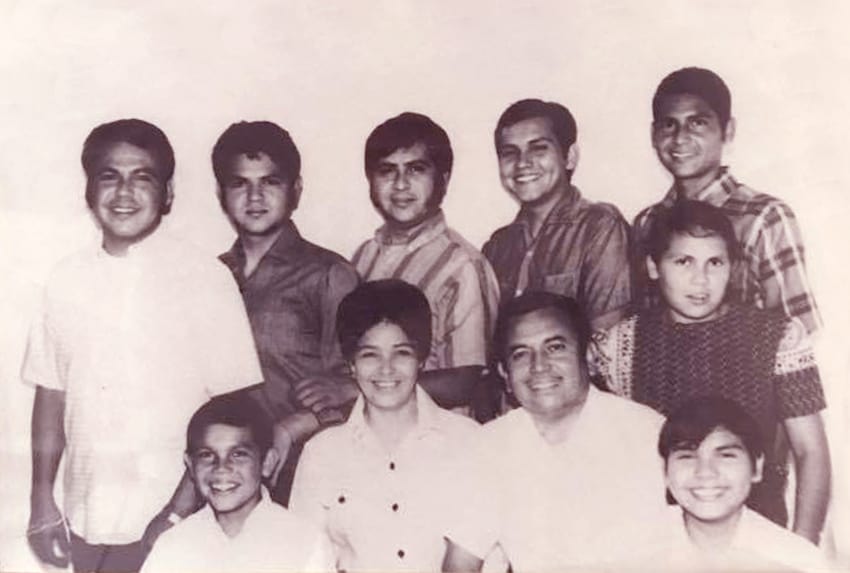 The Hernández family in the mid-sixties
The Hernández family in the mid-sixties
Clockwise: Antonio, Crescencio (†), Pedro, Humberto (†), Jesús, Guadalupe, Josefina, don Esteban (†), doña Eva (†), José.
According to Chencho, he began playing the triangle at age three, and later graduated to playing the saxhorn (saxor) in his village’s municipal band. His music teacher was that band’s leader, José Odilón Navarro. Chencho’s father, Esteban Hernández, played in local Mariachi Chapala, and in 1949, their group found steady work in the border town of Mexicali, Baja California. Chencho’s entire family moved there, but his grandparents soon brought him and his two older brothers back to Chapala to live with them for nearly a decade, a separation he would later describe as traumatizing.
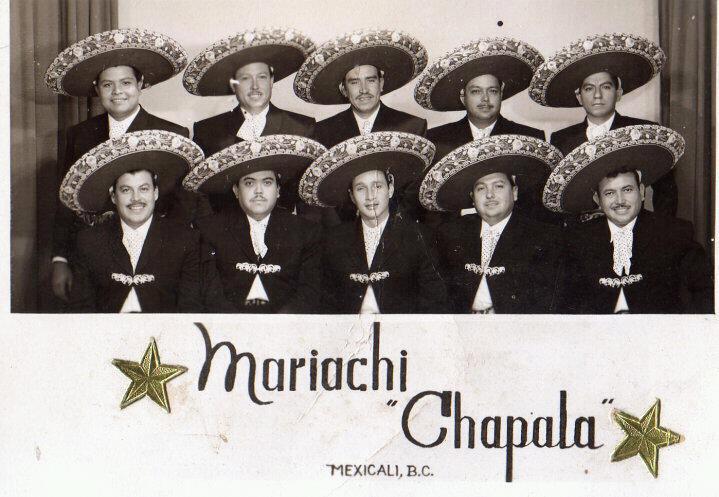
It wasn’t until 1959, at age 13, that Chencho’s parents finally brought him from Chapala to Mexicali to live with them. Seeing that mariachi trumpet players were in short demand, Esteban bought Chencho a trumpet, hoping his son would take an interest in that instrument. “Within six months, he had already learned to play it!” his father recalled. No one could believe it was possible to master the trumpet in so short a time. Within a year, young Chencho was playing with one of the best mariachis in Mexicali.
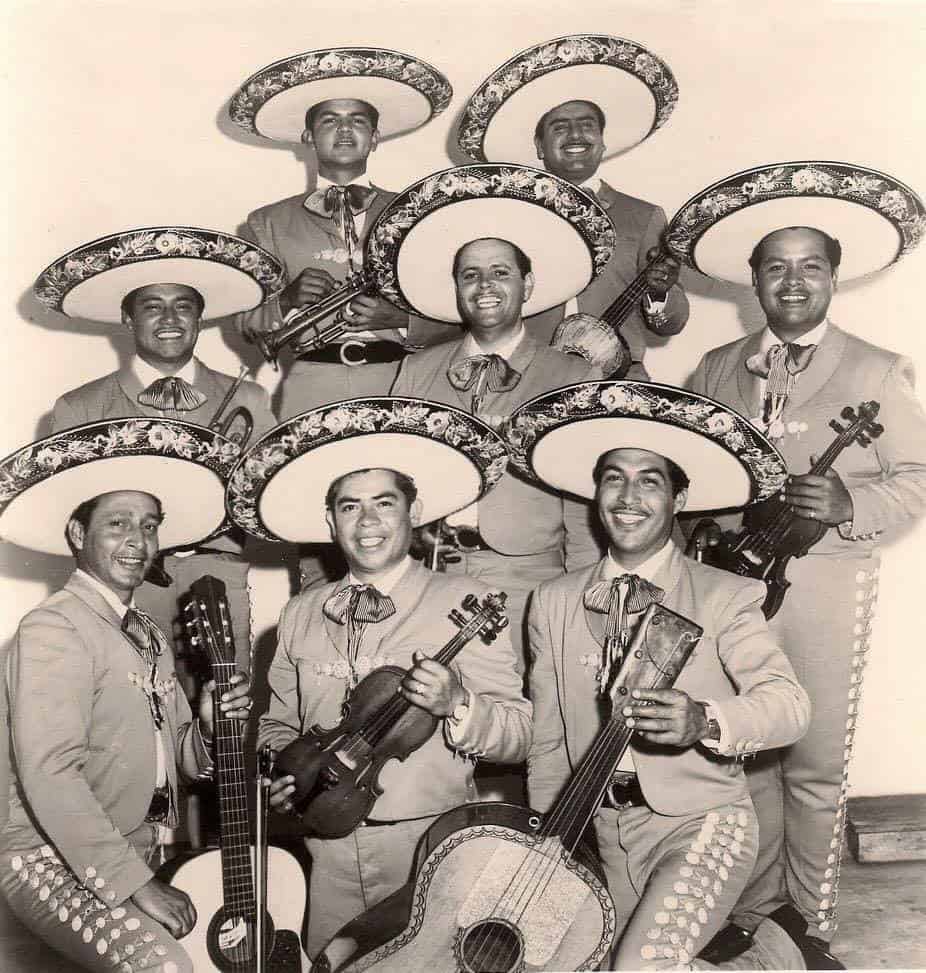
Mariachi Los Camperos, circa 1964
Back row: Crescencio Hernandez, Pablo López.
Middle row: José Ordaz, David Coronado, Natividad Cano.
Front row: Ricardo González, Febronio Cobarrubias, Clemente Delgadillo.
By age 15, Chencho had moved to Los Angeles, where he was playing alongside his father in Mariachi Águila, one of the best groups in southern California at that time. Nati Cano soon took notice of Chencho’s abilities, and in 1962 invited the precocious teenager to Los Camperos, a mariachi he had recently taken over the leadership of. After about a year with Nati’s group, Chencho returned to Mariachi Águila, Los Camperos’ leading competition at that moment. Águila’s musical director was Pepe Martínez, who would later go on to found Mariachi Nuevo Tecalitlán and direct Mariachi Vargas de Tecalitlán. In his second period with Mariachi Águila, Chencho paired on trumpet with his older brother Pedro, later known as “Pedro Rey.”
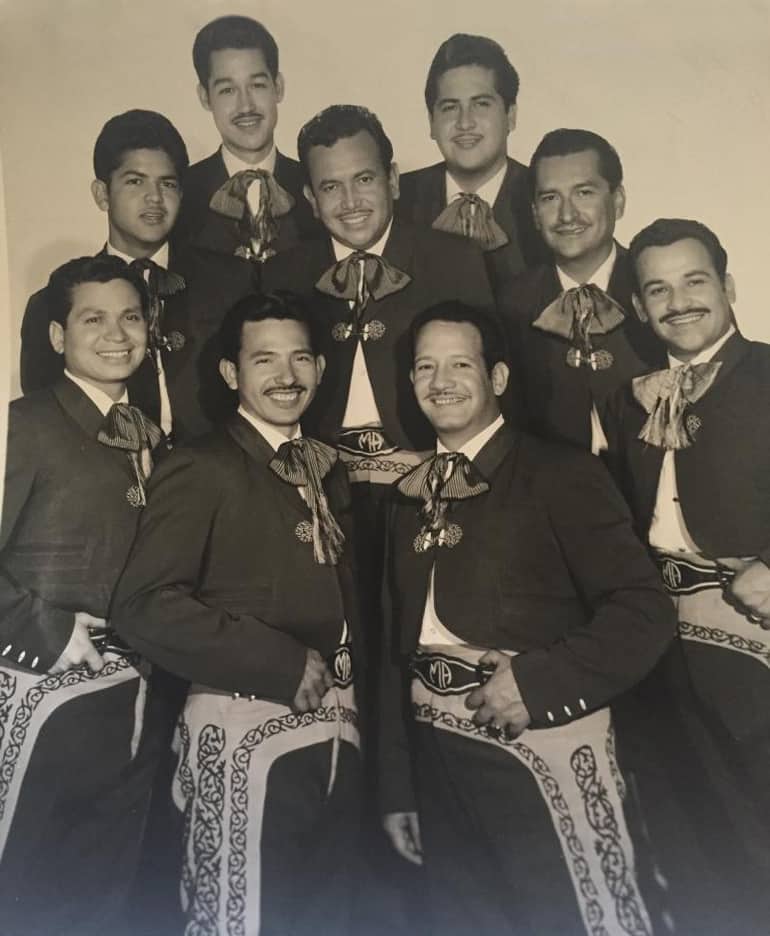 Mariachi Águila in the mid-1960s
Mariachi Águila in the mid-1960s
Top row: José Martínez, Pedro Hernández.
Middle row: Crescencio Hernández, Esteban Hernández, Jesús Montijo, Luis Aguilar.
Bottom row: Roberto Gutiérrez, Miguel González, Rafael Aguilar.
By the mid-1960s, Mariachi Vargas was transitioning from one solo trumpet to a trumpet duet, and was continuously trying out different trumpeters. In 1966, they invited Chencho’s brother Pedro to replace the legendary Cipriano Silva, who had become unreliable due to excessive drinking. After trying out different segunderos, Pedro convinced musical director Jesús Rodríguez de Híjar to bring his younger brother, Chencho, into the group. Already having outstanding musical rapport from their recent tenure together in Mariachi Águila, the two brothers were well-received in Mariachi Vargas. “Pedro and Chencho had completely opposite personalities, but they complimented each other perfectly. “They were like yin and yang,” says their brother, José.
Rubén Fuentes recalls the Hernández brothers as the very first trumpet duet in Mariachi Vargas that he personally liked. Of all the trumpet duets the group auditioned during that era, he recalls, “They had the best rapport, and I wrote specific arrangements to take advantage of their qualities; Pedro on first, Chencho on second. They harmonized beautifully, more expressively than any previous duet.”
Federico Torres, trumpeter for half a century with Mariachi Vargas who performed and recorded extensively with both brothers, clarifies that while Chencho was by far the most technically proficient of the two, Pedro was naturally gifted with an extraordinarily beautiful tone. “Of all the trumpet playing Hernández brothers [Pedro, Toño, Chencho, and José], Pedro always had the most attractive sound. It’s basically a gift you’re born with, as opposed to something you acquire.”
But Pedro’s magnificent tone inadvertently caused discord between the two brothers. Here’s how he tells the story:
“Chencho always wanted to play first trumpet. I would explain to him, ‘I don’t mind at all playing second or even third, but I have strict orders from Rubén [Fuentes] and Chuy [Jesús Rodríguez de Híjar] that I’m supposed to play first, which is why I can’t let you have that part.’ But my brother never accepted this, and he grew more and more resentful. One night in Mariachi Vargas’ dressing room at the Teatro Blanquita, we had a heated discussion, and that was the end of our duet. I asked Chuy for permission to return to Los Camperos, telling him, ‘Call me in case you ever need me.’ A couple of months after I left, Chencho left the group as well.”
— Pedro Rey
Returning to Los Angeles after his initial sojourn with Mariachi Vargas, Chencho formed his own ensemble, Mariachi Los Gallos, which included his father and his brother Antonio. Chencho soon left that group, but it continued on without him. When he forbade them from using his group name, they changed it to Mariachi Los Galleros, and his brother Pedro eventually took over the leadership. Upon leaving the original group, Chencho organized a brand-new Mariachi Los Gallos made up of very young players. Vihuela player José “El Pozole” Arellano, a founding member of the juvenile incarnation of Los Gallos, recalls: “I joined around October of 1968. Chencho had recently returned from Mexico. Under his direction, we played five days a week, from 3-7 pm, at a restaurant called Casa de Fritos, in the Frontierland section of Disneyland. Nati Cano opened his restaurant around that time, and evenings we would often play at La Fonda to substitute for Los Camperos when they had out-of-town engagements or went on tour.”
In 1966, during his first period with Vargas, Chencho had recorded several songs as a guest on the futuristic self-titled album Mariachi Los Monarcas. One of the selections on that LP was “La Bikina.” Chencho mounted this novel piece with Los Gallos, and they recorded it on a 45-rpm single that received regional airplay, previous to Mariachi Vargas’ famous release of that song.
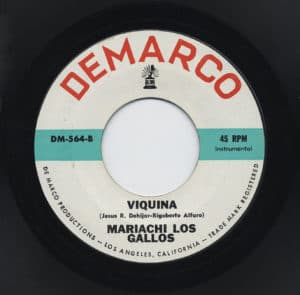
Courtesy of the Arhoolie Foundation
In the late 1960s, Chencho disbanded Mariachi Los Gallos and returned to Mexico to play with Mariachi Vargas once more, where his brother Pedro was now playing guitar, and sometimes trumpet. Vargas changed trumpet players with extreme frequency during that period.
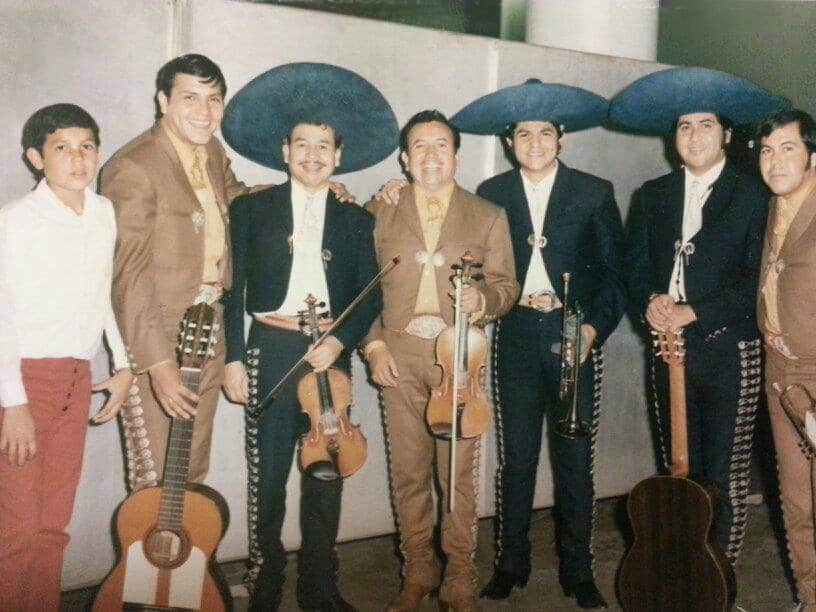
Members of Mariachi Los Galleros pose with members of Mariachi Vargas backstage at the Million Dollar Theater, circa 1969. Both mariachis were on the same show that day. Young José wasn’t yet a mariachi musician.
Left to right: José Hernández, Humberto Hernández, Heriberto Molina, Esteban Hernández, Crescencio Hernández, Pedro Hernández, Antonio Hernández.
Whereas Pedro and Chencho had opposite personalities, Cipriano and Chencho were perhaps too much alike. Both were highly competitive and had short fuses. Not surprisingly, the two never got along very well. Musically speaking, though, they made an incredible combination. Some of the most memorable recordings of that era were made with Chencho and Cipriano in duet. One album from this period that stands above all others is the iconic El Cantinero, by José Alfredo Jiménez, a personal favorite of countless mariachi musicians and fans today. Manuel Valle “El Chivo,” probably the most recorded mariachi trumpeter of all time, considers this his personal favorite: “In my opinion, it’s the greatest ranchera album of all time, featuring one the most outstanding mariachi trumpet duets to ever be captured on record.”
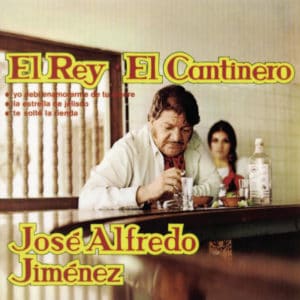
This 1971 RCA Victor release featuring Chencho is considered one of the greatest mariachi records of all time.
Cipriano didn’t remain long during his final stint with Mariachi Vargas (1970-71), and for a year or so after he left (1971-72), Rigoberto Mercado played in duet with Chencho, who would later refer to Rigo as the finest segundero he had ever worked with. Mercado likewise speaks highly of Hernández. After Chencho left, Mariachi Vargas’ era of trumpet instability ended, and the duet of Federico Torres and Rigoberto Mercado continued uninterruptedly for more than 20 years.
After leaving Vargas for the last time in 1972, Chencho returned to Los Angeles, where he basically spent the next two decades alternating between Los Camperos, his own group, and, less frequently, Los Galleros. By the mid-1970s, he had reorganized Los Gallos, and they were back at Disneyland. Los Gallos was an important training ground for many budding musicians, not the least of whom were Chencho’s younger brothers. Jesús and José acquired their first performing experience in Los Gallos during the summer of 1975, while both were on school vacation. Their brother Humberto had gotten his start a decade earlier, in the band’s original incarnation.
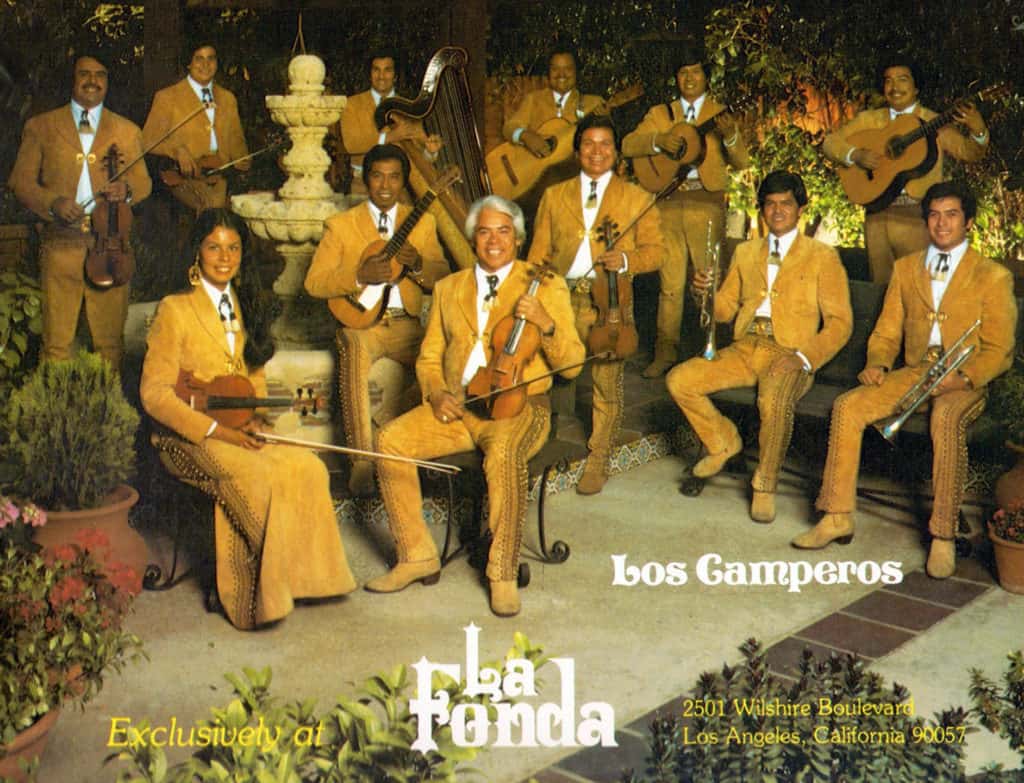 Mariachi Los Camperos, circa 1978.
Mariachi Los Camperos, circa 1978.
One of the last photos Chencho took with Los Camperos.
Back row: Pablo López, Eduardo González, Arthur Gerst, Natividad Cano, Luis Damián, Arturo Palacios.
Front row: Rebecca Gonzales, Manuel Vásquez, Febronio Covarrubias, Roberto Gutiérrez, Crescencio Hernández, José Luis Salinas.
Los Gallos regrouped again in the mid-1980s and were one of the headline acts at the 1986 Universal Studios mariachi festival. Between the years 1990-1992, Chencho was an on-and-off early member of Mariachi Sol de México. For a couple of years during the mid-1990s, he revived Mariachi Los Gallos for what would be that group’s final reincarnation. Although it wasn’t a stable ensemble, Los Gallos de Crescencio Hernández existed intermittently for over four decades.
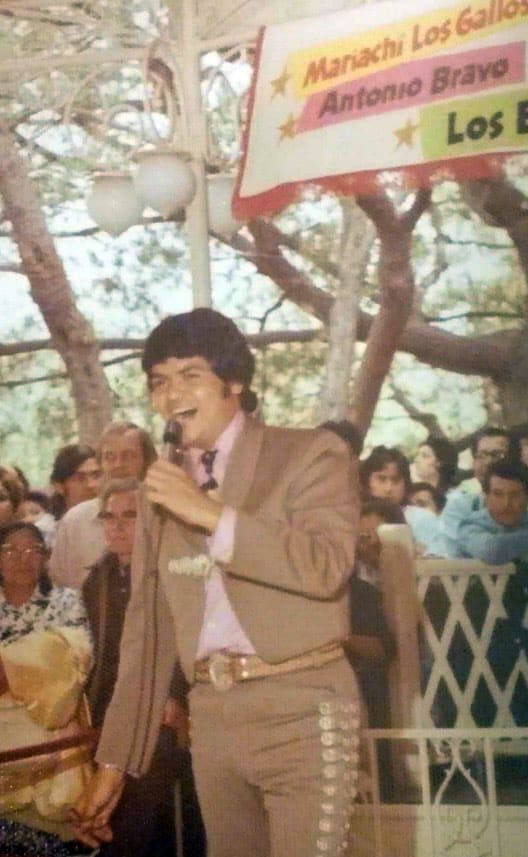
Chencho at Disneyland in the late 1970s,
performing under the artistic name “Antonio Bravo.”
Chencho could definitely be impatient and hypercritical, but he could also be charismatic and charming, and he had a large number of friends, students, and admirers. Although he had been married several times, Chencho was single at the time of his death. He is survived by 10 children — Maricela, Crescencio Jr., Mónica, Andrea, Michelle, René, Steven I, Joseph, Steven II, and Claudia — and numerous grandchildren and great-grandchildren.
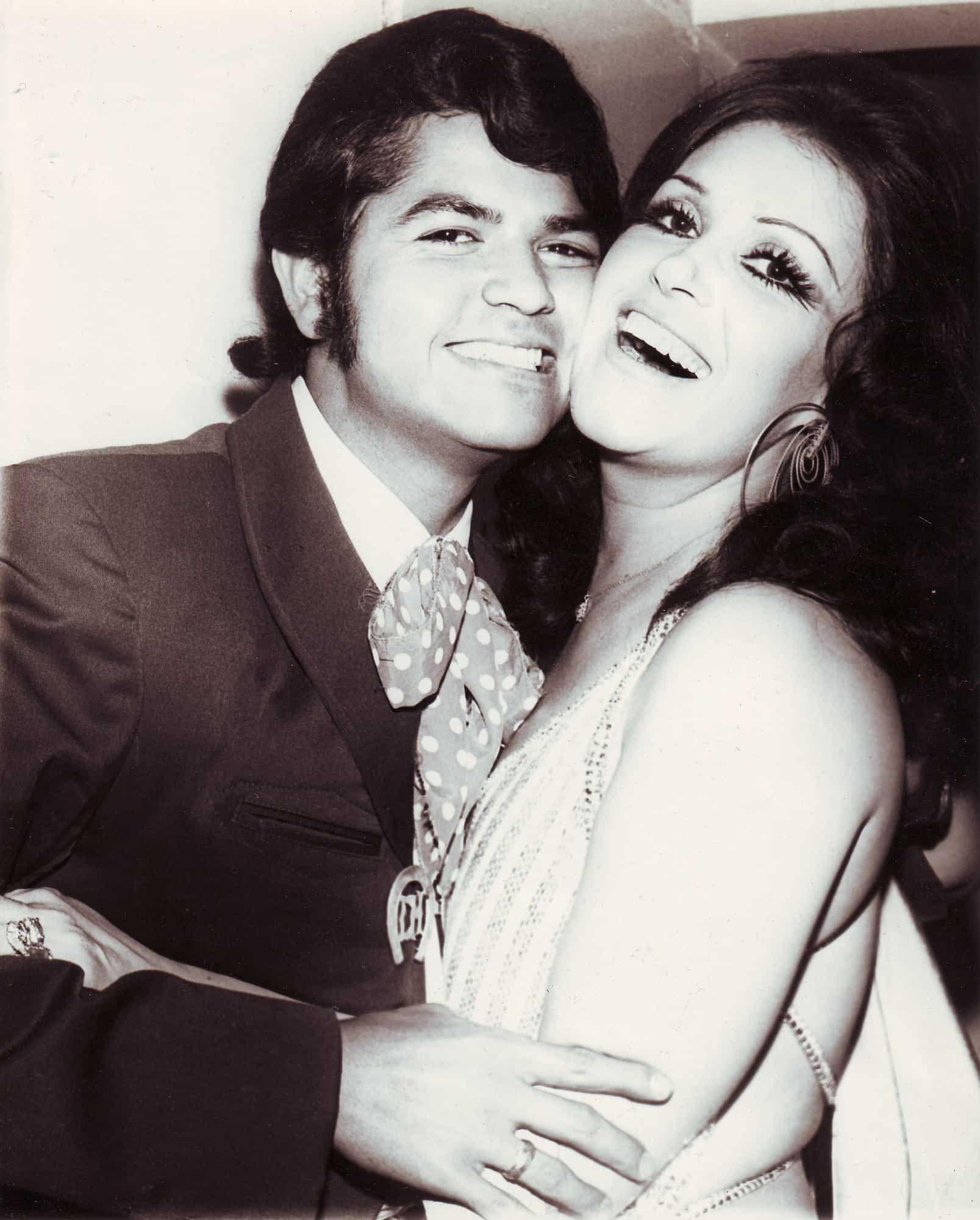
Singer Lucha Villa was one of many artists Chencho accompanied during his career.
In the early 1990s, Chencho moved permanently to Mexico, establishing simultaneous residences in Chapala and Guadalajara. In 1992-93, he and his brother Antonio played trumpet in Vicente Fernández’s mariachi, a group from León, Guanajuato ironically named Mariachi Chapala. After a year, the brothers grew weary of the three-hour drive to León and left the group. Around that time, Vicente’s son Alejandro had recently launched his own singing career, and Vicente secured Chencho a position as his son’s musical director. Chencho’s original theme “El Potrillo” was released on Alejandro Fernández’s 1995 CD Que Seas Muy Feliz. He remained with Alejandro for about a year.
Whether formally employed or not, Chencho always remained musically active. In Guadalajara, he gave private lessons and rehearsed several groups, including Las Perlitas Tapatías, Mariachi Cuahutémoc, and Mariachi Los Toritos. He gave workshops and master classes as far away as Colombia. He built his own recording studio, recorded as a guest with other groups, and arranged and produced two solo CDs of his own, as well as productions for other artists. From 2000 to 2003, he directed his own ensemble, Mariachi Los Potrillos, which turned out to be a training ground for musicians who would later join mariachis Sol de México, Internacional Guadalajara, Los Pérez, and other renowned groups. In 2005, he recorded and toured with Jesús Rodríguez de Híjar’s famed Mariachi de América.
Chencho was innately studious. “Of all of our family, Chencho was by far the most disciplined,” asserts brother José. “Outside of work, Chencho really didn’t have a social life. He spent all his time making himself better at his craft.” I once asked Chencho where he acquired his unusual degree of discipline from, and he attributed it to Nati Cano. “Anything I ever learned that was worthwhile,” he assured me, “I learned from Nati Cano.”
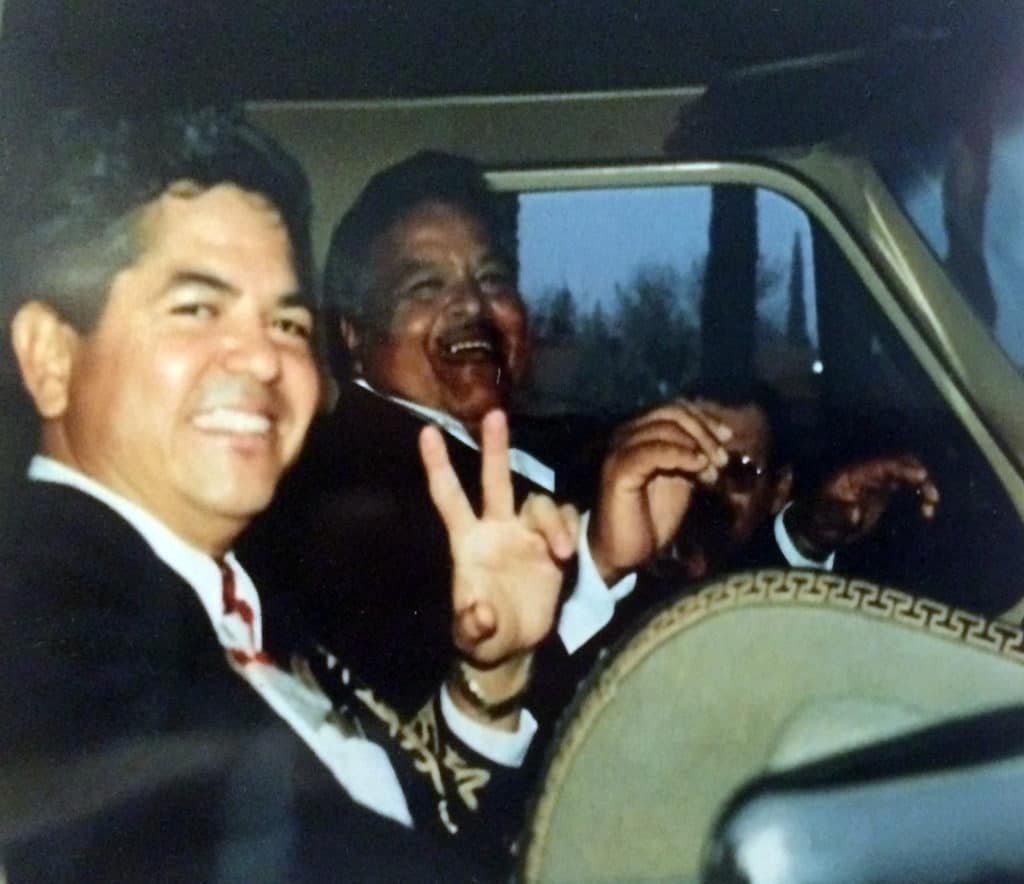
Chencho and Nati Cano
Chencho’s studiousness was not limited to music. He was constantly studying new disciplines. He held an AA degree in Language Etymology from Río Hondo College and had certificates in Audio Engineering, Computer Technology, Real Estate, and Automobile Repair. He had studied arranging at the Dick Grove School of Music and was finishing his prerequisites to enroll as a music major at California State University, Los Angeles when his failing health sabotaged those plans.
Crescencio Hernández was — and continues to be — an inspiration for countless mariachi trumpet players. His brother José credits him as being the reason for his choosing that instrument:
“When I was about nine years old, around 1967, I heard Chencho play with his group, Los Gallos, at the Million Dollar Theater. It was the first time in my life I literally got goose bumps. Chencho was backing Amalia Mendoza and playing the introduction to José Alfredo’s ‘Cuando Nadie te Quiera.’ That was the moment I knew I wanted to play trumpet.”
— José Hernández
Chencho had three primary trumpet influences: Stylistically, it was Miguel Martínez and Cipriano Silva. He mastered the styles of those two and added to them. Technically, it was Rafael Méndez, particularly in the area of articulation. “One thing that always distinguished Chencho was his precise articulation,” says his brother José. In addition to those three, Chencho had certain jazz and pop influences, like Harry James and Herb Alpert. He was one of the first to introduce jazz and pop trumpet stylings to mariachi music. “He enriched the vocabulary of the mariachi trumpet,” says José. “Chencho was the most complete mariachi trumpeter of his era,” adds brother Antonio. Those who wish to explore the wide range of Chencho’s stylistic dimensions are invited to listen to the audio and video links at the end of this article.
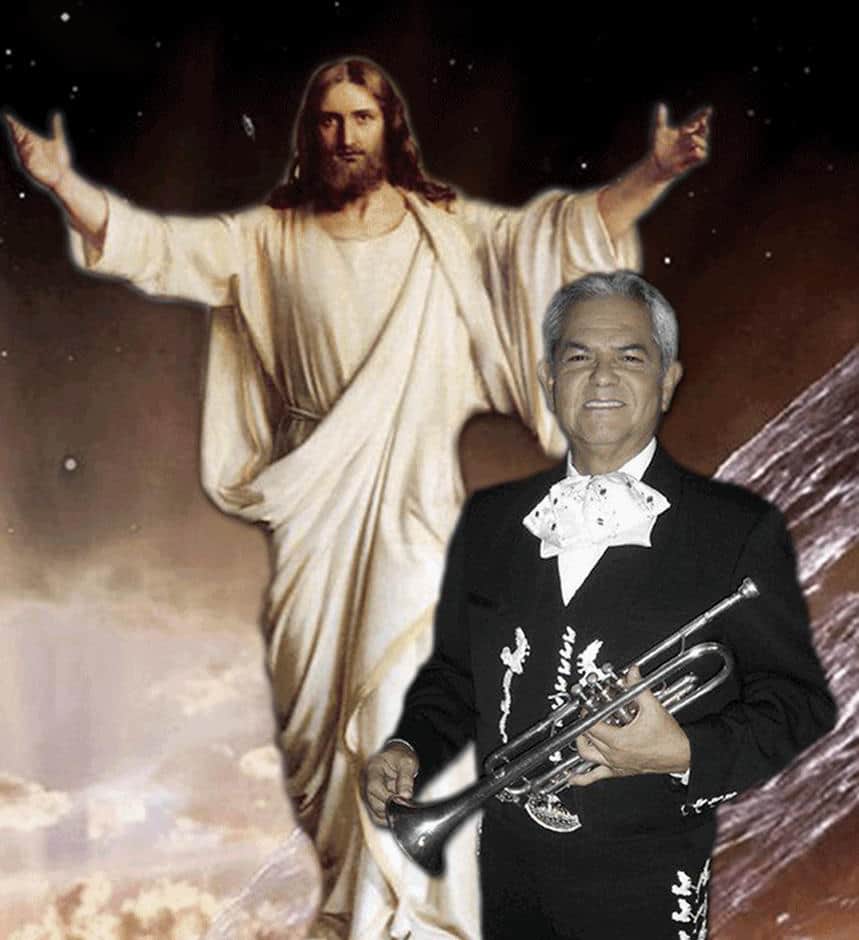
Raised Catholic, around the beginning of the millennium Chencho became an evangelical “born again” Christian. One would think this newfound religion would have tempered his impatience and softened his sharp tongue, but it only did so to a limited degree. Jesús Hernández views Chencho’s unvarnished criticism of others as a product of his brother’s refusal to tell little white lies for the sake of politeness: “Chencho was always a very point-blank person. If you suggested he be more diplomatic, he’d reply, ‘The Bible says to always tell the truth, and I’m telling the truth!’”
In the summer of 2013, Chencho was diagnosed with prostate cancer. After surgery, his disease went into remission, only to return two years later. While his health went gradually downhill, his faith and his will to live remained strong until the very end. He practiced his trumpet daily until it became physically impossible for him to do so, and even in the final months of his life, he continued to give trumpet lessons via Skype.
Over 300 people attended Chencho’s funeral on July 24, 2017 at Rose Hills Memorial Park in Whittier, California. At least 100 of these were uniformed mariachi musicians, including members of Sol de México, Reyna de Los Ángeles, Los Camperos, Internacional de México, Los Reyes, and ex-members of Los Galleros.
Timoteo “Tello” González sings his final adiós to Chencho
No matter where you rank Chencho Hernández in the pantheon of departed mariachi musicians, he was definitely one of the greats. On behalf of the entire mariachi community, mariachimusic.com extends its sincerest condolences to the Hernández family for their irreparable loss. May our dear friend and compañero rest in eternal peace. He will be greatly missed.
—Jonathan Clark
Please leave your comments below
PROGRAMS & CONCERTS
Alejandro Fernández “La Enramada” (Chencho de solista)
https://youtu.be/6UR593OLV68
Vicente Fernández “Usted” (Chencho 1ª, Toño Hernández 2ª)
https://youtu.be/Hv2WW6FEqmU
Mariachi de América de Jesús Rodríguez de Híjar Popurrí de Guadalupe Trigo (Chencho de solista con Felipe San Agustín y Jesús Villegas, trompetas)
https://youtu.be/iMiit8BG8Ao
Mariachi Sol de México “Celos” (Chencho de solista; José Hernández, José Manuel Ramírez y Santiago García, trompetas) 1997
https://youtu.be/wE5l7_7H7uk
Mariachi Sol de México “Paloma Negra” (canta Chencho; José Hernández y Jorge Contreras, trompetas)
https://youtu.be/wZZm5zhO5Gw
Mariachi Sol de México “Homenaje a Nuestra Madre” (Pedro, Toño, Chencho y José Hernández, trompetas)
https://youtu.be/8XYsvR0IVPI
Mariachi Sol de México Popurrí España (Chencho de solista) 1997
https://youtu.be/WU5uJ4odZQE
Mariachi Sonidos de América “Cuando Vivas Conmigo” (canta Chencho; Francisco Xavier Serrano “el Loco” y Francisco “Paco” Aguilar, trompetas)
https://youtu.be/dAYlMGQmyyY
Mariachi Sonidos de América “La Gitana” (Chencho de solista; Francisco Xavier Serrano “el Loco” y Francisco “Paco” Aguilar, trompetas))
https://youtu.be/leEly4fWGt8
Mariachi Sonidos de América “Oh, Gran Dios” (Chencho de solista; Francisco Xavier Serrano “el Loco” y Francisco “Paco” Aguilar, trompetas)
https://youtu.be/0ddrGPbHHQ4
Mariachi Los Potrillos “Las Trompetas del Diablo” (Chencho de solista con César Becerra, Martin Díaz y Jorge Contreras, trompetas)
https://youtu.be/3vgOD6LUdQk
SOUND RECORDINGS
Felipe Arriaga “Fina Estampa” 20 de mayo de 1972
https://youtu.be/e9Am-2uzxcA
Charro Avitia con el Mariachi Vargas “Ya lo Pagarás con Dios” (Pedro y Chencho)
https://youtu.be/PdbUk3_5gIE
Aída Cuevas y Vicente Fernández “Quiéreme Mucho”
https://youtu.be/tjghZ8yxso8
Yolanda del Río con el Mariachi Vargas “La Hija de Nadie” 21 de enero de 1972
https://youtu.be/QmTfa7_C-VA
José Alfredo Jiménez con el Mariachi Vargas “Gracias” (Chencho 1ª, Cipriano 2ª) mayo de 1972
https://youtu.be/w9zyMMa0D-M
Mariachi de América de Jesús Rodríguez de Híjar “La Nueva Guadalajara” (arreglo y composición de Chencho)
https://youtu.be/C4cAdBrbdD8
Mariachi Águila “Los Machetes” (Pedro y Chencho) circa 1964
https://youtu.be/vLzH9uu6DOA
Mariachi Nuevo Tecalitlán “Mi Amor es Una Trompeta” (Chencho toca las tres trompetas) circa 2006
https://youtu.be/UYiGZBbgUII
Mariachi Vargas de Tecalitlán “Desengaño” (Pedro 1a, Chencho 2a) enero de 1967
https://youtu.be/f0F1HXcUHZc
Mariachi Vargas de Tecalitlán “Duda” (Pedro 1a, Chencho 2a) enero de 1967
https://youtu.be/wz0gGk2GJlM
Mariachi Vargas de Tecalitlán “El Faisán”(Chencho 1ª, Jesús Córdoba 2ª) enero de 1967
https://youtu.be/GWrd57qXW2Q
Mariachi Vargas de Tecalitlán “Tristes Jardines”. ”(Chencho 1ª, Jesús Córdoba 2ª) enero de 1967
https://youtu.be/d_p9fnKK0Xg
Pedro Rey con Los Galleros “Grande, Grande” (Chencho de solista)
https://youtu.be/1lUwKcFJ30E
Gerardo Reyes “Sin Fortuna” 22 de mayo de 1972
https://youtu.be/zPK11PlFTWg
Rubén Rodríguez and his Guadalajara Kings
Tequila & Cream (1966)
https://youtu.be/P-DXyzbHD8Q
Rubén Rodríguez and his Guadalajara Kings
The Utterly Fantastic and Totally Unbelievable Sound of… (1966)
https://youtu.be/NmK93jJlQ08
Roberto Sasián y su órgano con el Mariachi Vargas “El Jinete” (Chencho de solista)
https://youtu.be/6hSdayDdl5I
Mariachi de América de Jesús Rodríguez de Híjar Popurrí de Guadalupe Trigo (Chencho de solista)
https://youtu.be/iMiit8BG8Ao
Alberto Vásquez con el Mariachi Vargas “Qué Suerte la Mía” (Chencho 1a, Rigoberto Mercado, 2a)
https://youtu.be/LfGuTd7isHo
Alberto Vásquez con el Mariachi Vargas “Rogaciano el Huapanguero” (Chencho 1a, Rigoberto Mercado 2a)
https://youtu.be/FSV0Z3yotno
Lucha Villa con el Mariachi Vargas “Mi Ciudad” (Chencho 1a, Rigoberto Mercado 2a)
https://youtu.be/LsMOf21ohwE
Lucha Villa “No te Arrepientas” (Chencho de solista con el dúo de Federico Torres y Rigoberto Mercado)
https://youtu.be/Q-TAVgNj38w
Lucha Villa con el Mariachi Vargas “Te Traigo las Flores”
https://youtu.be/1m_ONXgxlaI

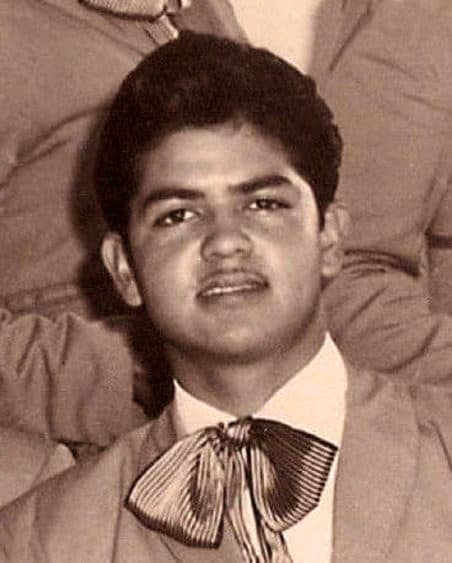
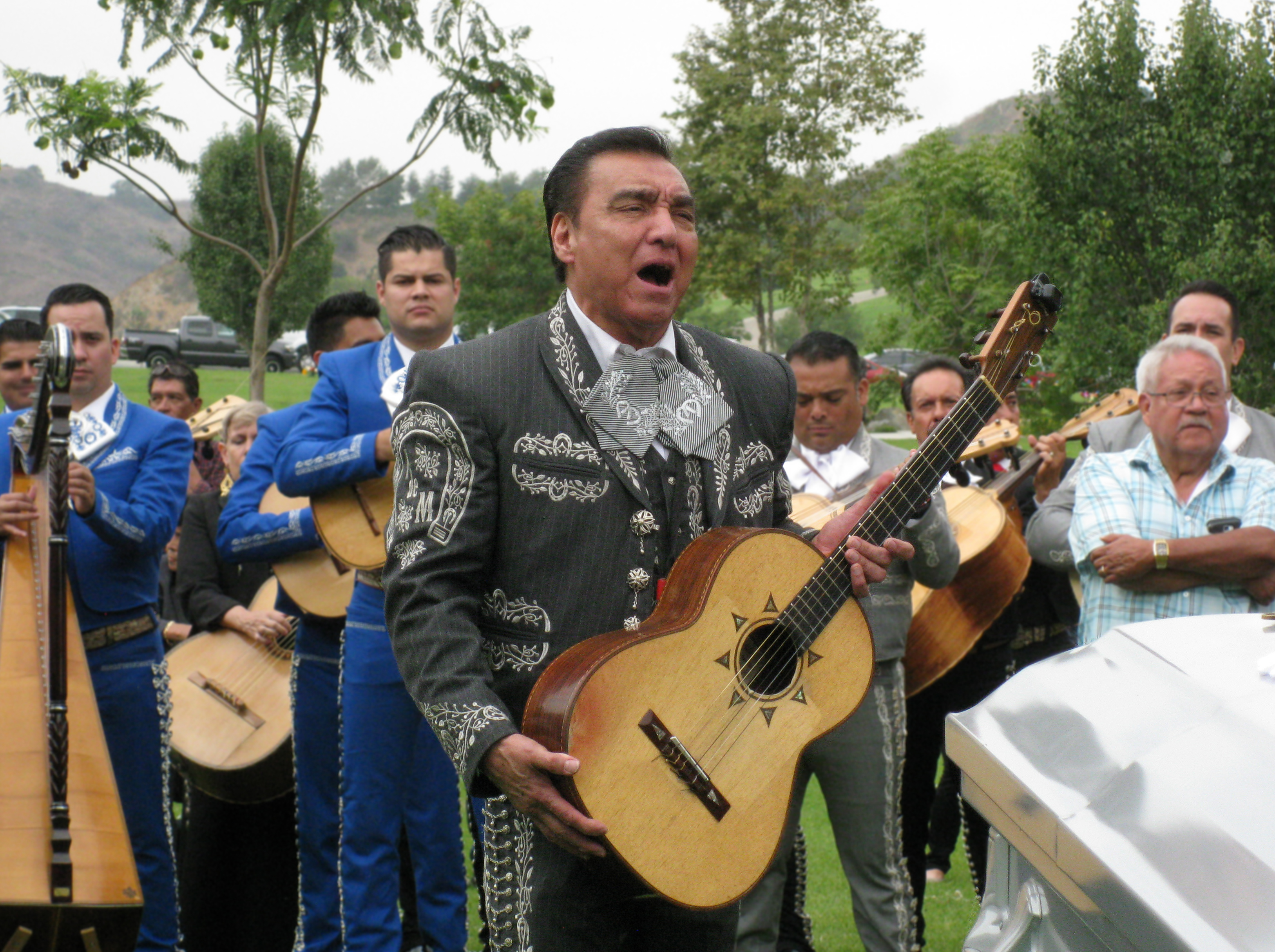

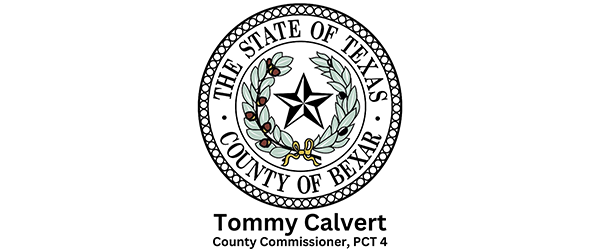

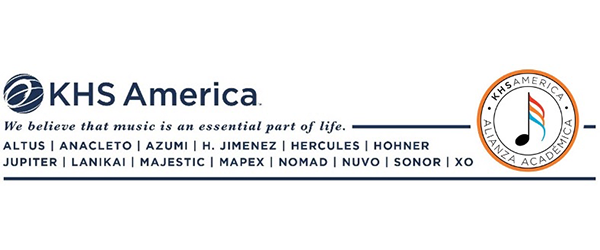
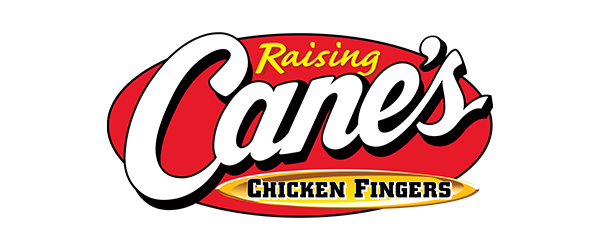
What a great article to honor the life of el gran maestro Crescencio “Chencho” Hernández! I had the great fortune of being his student, but above all, his friend. He will always hold a special place in my heart throughout my mariachi music career.
Hablar de “don Chencho” Hernández, como lo llamaban mis hermanos Juan José, Cristóbal y yo, es sin duda algo muy especial para nosotros. Desde los 13 años emigré a Chapala, Jalisco, donde tuve la fortuna de conocerlo. Cuando le pedí que si podía darme clases de trompeta, con gran emoción me dijo que sí. Después él hizo el Mariachi Los Potrillos de Crescencio Hernández, en el cual hice una nueva familia con mis compañeros de los que tengo tantos recuerdos tan bonitos. Tuve la fortuna de conocerlo como músico y como amigo, y eso nunca lo voy a olvidar.
Estoy muy agradecido con don Chencho, porque gracias a él soy lo poquito que he logrado como trompetista y como músico. El día 19 de julio de 2017 sin duda quedará marcado como día de luto para muchos de nosotros.
Gracias, don Chencho, por todo lo que nos enseñó, por todos los consejos, regaños, toda la disciplina, todo lo musical que me dio a mí, a mis hermanos y ex compañeros: la familia del Mariachi Los Potrillos.
En paz descanse y Dios lo tenga en su santa gloria.
Atte: Jorge Contreras Cruz
The mariachi world lost a great musician in Chencho Hernandez. I had the great pleasure of performing with Chencho nightly at La Fonda de Los Camperos for several years, and will never forget his wonderful trumpet playing, professionalism and friendship. He treated me as an equal, with kindness and respect, and he will always have a special place in my heart.
My condolences to the Hernandez family.
Descanse en paz, maestro. Saludos desde Madrid para todos los compañeros del mariachi.
Mi querido Johnny, excelente semblanza que hiciste sobre el gran músico jalisciense, Chencho Hernández. Desconocía varias cosas que ahí comentas sobre su trayectoria. ¡Te felicito de verdad!
Yo conocí a Chencho en el Million Dollar Theater cuando tenía como 16 años. Era un jovencito amable y correcto. Tocaba trompeta con el grupo de Nati Cano. Me tocó conocerlo por la razón de que en esa variedad estaba el Dueto Azteca, formado por mi esposo Memo Quintero y yo, y nos acompañaba el Mariachi Los Camperos. Hicimos varias grabaciones con Los Camperos y en México también me tocó verlo en el Mariachi Vargas, que también nos acompañó en varias grabaciones y ahí estaba Chencho.
Mi esposo Memo y yo casi íbamos cada fin de semana a cenar o en La Fonda o en El Rey. A veces Chencho andaba con Los Camperos, a veces con Los Galleros, y seguido iba a México. Duraba muy cortas temporadas con los grupos.
Una de las canciones que más seguido cantaba era Paloma Negra. Quiero decir una cosa: Lola Beltrán fue la que dio a conocer la canción, pero quién le daba la mejor interpretación era Chencho. No sólo la cantaba, sino la interpretaba. Era muy buen trompetista y cantante. Se sentía profundamente lo que él cantaba y lo que tocaba en la trompeta.
Chencho fue muy amable con nosotros y mi esposo Memo y yo siempre le consideramos como un hijo. Siempre que nos encontrábamos, nos dábamos nuestro abrazo y le preguntaba “¿Cómo has estado, mi hijo?” Siempre lo recordaré con mucho cariño.
ADIÓS, MI HIJO…..
María Padilla
Después de haber leído tu narración acerca de Checho, le doy más sentido a lo que conviví con él durante su estancia con Los Camperos. Gracias, Joni, por compartirnos su trayectoria. Saludos.
Maravillosa biografía de un gran artista con afectos y defectos de todo ser humano, una trayectoria de disciplina y de sueños.
Descansa en paz, querido Chencho.
Johnny, thank you for this wonderful article. I know you put a lot of work into it. It truly shows, and I’m eternally grateful. As we all know, my father was very, very talented and an extremely hard worker, very dedicated to his craft. I feel that you captured the essence of his life in this article. I appreciate all of the condolences and well-wishes from everyone who commented. On behalf of my family and myself, once again, thank you so much!
Your friend always,
Chencho Jr.
Wonderful article, Jon. Thanks for the historical perspective on a great musician, one of the “dinastía Hernández”. We thoroughly enjoyed it and are looking forward to more of your articles.
My dear friend Jonathan,
When it comes to words and details on anything that has to do with history in the mariachi world, you know how to capture a person’s essence. For those of us who knew the artist you write about, and for those that did not have the plaeasure of his acquaintance, you take us through a journey down Memory Lane…
Sometimes we don’t take the time to get to know people with such amazing historias when they are still here with us, and for those of us who didn’t, you let everyone know what they were missing and how great those people are. This amazing work you have done took time and a lot of effort and kindness…
I remember when we went to Chapala to Chencho’s home and he took us to his favorite restaurant. You guys were reminising on photograhps and had plenty of anécdotas… Those were special times. I can imagine how hard it was for you to write these beautiful words without tears in your eyes, for I was present when he told you how much your friendship meant to him…
For all of us who knew Maestro Chencho, he was not one to show a lot of emotion, but he was very expressive when it came to speaking his mind on the topic of music. That’s what made him who he was…
Maestro Chencho, thank you for your consejos. You will be missed, but never forgotten.
Jonny, qué hermosos trabajo. Un abrazo y gracias por ser el que nos da la historia de nuestros maestros de la música más bella del mundo, la Música del Mariachi.
Buenavibra musical. Bendiciones.
Con cariño,
Tu amiga,
Cassandra Trejo~
Trabajé con Chencho en los 90’s, en el Mariachi de América. Recién llegaba de Estados Unidos y Don Jesús lo integró al Mariachi de América, a pesar de que serían tres trompetas: Manuel del Real (el árabe), Gustavo Alvarado y Chencho. Sólamente fueron algunos meses con tres trompetas. Al poco tiempo, Gustavo fue invitado al Vargas y Chencho se quedó con Manuel como pareja… En esos meses se grabó el disco de Aída Cuevas llamado “Te traigo ganas”, así como de otros cantantes y algunos programas de televisión en los cuales apreciamos la participación de Chencho.
Me tocó conocer su alto y directo nivel de opinión, no se guardaba lo que pensaba, pero lo más sobresaliente era su nivel de ejecución.
Es lamentable la muerte de toda persona, pero Chencho nos deja un legado que impedirá que muera en nuestra memoria e historia musical. Que Dios lo guarde y sólamente puedo decir en la distancia que tenga un eterno descanso. Condolencias para su familia y condolencias también para toda la familia del mariachi.
Descanse en paz.
Dear Cynthia,
I do not have the honor of meeting you in person yet. However, being a lifelong mariachi musician and a fellow Texan, I am aware of the many great things that you have done to promote the music that I grew up with and that I also have a deep passion for. The reason I am contacting you is to express my gratitude towards you for the article you commissioned surrounding mi gran maestro Crescencio Hernández. I reached out to my good friend Johnny Clark to thank him for how well-written the article was, and he shared with me that you had personally commissioned it.
I had the great fortune of being a student and mentee of Chencho’s, and to have shared great memories with him throughout the last two years of his life. It was recording vocals on the last album arranged and directed by him that was the most memorable of all. As I prepare to launch my album in the upcoming months, I reflect on the gratitude I have for mi maestro, but also for the people who continue to honor and respect his legacy, and you are amongst those people. When I do officially launch this album, it would be an honor to share Chencho’s last masterpiece with you.
Once again, thank you for all that you do to promote our beloved mariachi music, and I hope to get the opportunity to meet you in the near future.
Sincerely,
Jesús “Chuy” Rodríguez
Beautiful article. My Tío Chencho was the inspiration for countless mariachi musicians. He was the reason why I chose to play the trumpet as well…… Thank you, Tío Chencho. Rest in peace.
So sorry to hear of your father’s passing. My name is Érica Delgadillo. I am the daughter of Clemente Delgadillo.
What a beautiful article. You have such beautiful photos. I was wondering if you have any more of my father. Unfortunately, he passed away too young, but I love coming across articles and seeing my dad’s face from time to time.
Tuve el honor de estar 9 años bajo su batuta. Soy el alumno que más años estudió con él, prácticamente viví mi infancia en su casa de Guadalajara. Conocí su modo de estudiar, que iba mucho más allá de simple disciplina, para él era un modo de vida. Estudiar para él era costumbre casi como comer. Lo vi trabajar en el estudio en su última producción, desde que comenzó a mostrarme los arreglos en Encore hasta que los ponía en el atril para los músicos. Tuve la fortuna de que hiciera para mí un disco de 10 temas, 8 de su composición, y pues obviamente todos los arreglos de él. Dos años de trabajo duro en el estudio de su mano, jornadas de días enteros escuchando sus consejos, sus regaños, pero también aprendiendo de su maravilloso buen gusto. Aprendí tanto de él sin saber quién era. ¡Hasta hoy en día que veo toda esta información en internet es cuando me doy cuenta! Gracias por compartir el legado de a quien yo con todo respeto llegué a llamar papá.
Erica Delgadillo, my father Benito Fletes y tu papá Clemente eran compadres. Tu papá was my God Father.
Your dad used to be a member of Mariachi Aguila and so was my father Benito. My father used to be la trompeta del Aguila. I remember when your dad passed away.
Mi nombre es Jessie S. Fletes, I live in Lompoc, Ca. My father died August 27, 2017. Great musicians. Chencho Hernandez worked with my father before my dad moved all the family to Lompoc in 1963.
Where do you live? I’m 71 years old. Would like to hear from you.